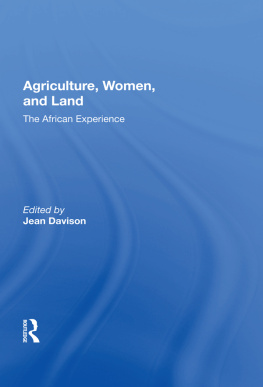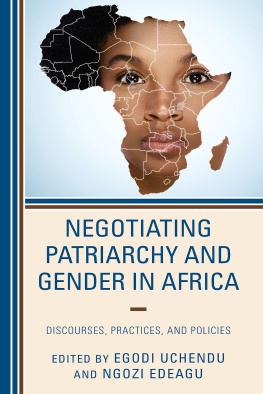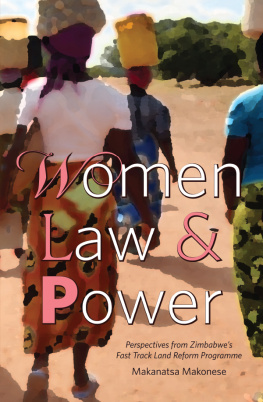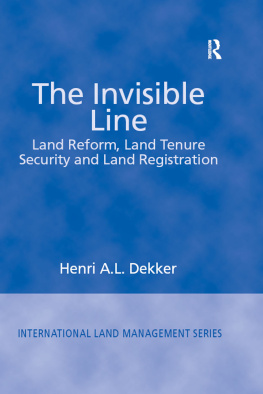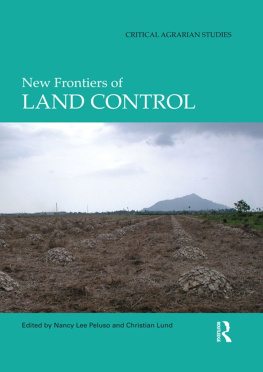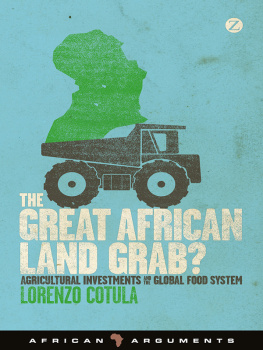First published 1988 by Westview Press
Published 2018 by Routledge
52 Vanderbilt Avenue, New York, NY 10017
2 Park Square, Milton Park, Abingdon, Oxon OX14 4RN
Routledge is an imprint of the Taylor & Francis Group, an informa business
Copyright 1988 by Taylor & Francis
All rights reserved. No part of this book may be reprinted or reproduced or utilised in any form or by any electronic, mechanical, or other means, now known or hereafter invented, including photocopying and recording, or in any information storage or retrieval system, without permission in writing from the publishers.
Notice:
Product or corporate names may be trademarks or registered trademarks, and are used only for identification and explanation without intent to infringe.
library of Congress Cataloging-in-Publication Data
Agriculture. women. and land : the African experience/edited by Jean
Davison.
p. cm. (Westview special studies on Africa)
Includes bibliographies and index.
Contents: land & womens agricultural production/Jean Davison
land tenure. agriculture. and gender in Guinea-Bissau/Ursula Funk
[etc.]Where can we
go from here? : recommendations for action/Kathleen Cloud and
Jane B. Knowles.
ISBN 0-8133-7421-9
1. Women in agricultureAfrica. 2. Land useAfrica. 3. land
tenureAfrica. 4. land reformAfrica. I. Davison. Jean. 1937
. II. Series.
HD6073.A292A353 1988
331.483096dc19
88-16924
CIP
ISBN 13: 978-0-367-01418-6 (hbk)
1
Land and Womens Agricultural Production: The Context
Jean Davison
Land, whether it is inherited, allotted, purchased or seized, is the most basic resource of agricultural production. Yet an increasing number of Africans find themselves without sufficient land to feed their families or, still worse, without land at all. In a period when total agricultural output in Africa is declining as the population growth rate advances (3.2% overall and as high as 4% in some countries), there is growing concern over the future capabilities of agricultural producers to meet the need for increased food production. In Africa, by and large, women are currently the major food producers. Womens relation to land, as conceptualized in different societies, is a critical factor in their ability to produce food for themselves and their families. At the same time, women increasingly have a need to generate income for commodities and services they cannot provide. In areas where a cash economy has taken hold, womens agricultural labour at the compound-household level is likely to be undercompensated or not compensated at all (Deere & Leon de Leal, 1981; Safilios-Rothchild, 1982). In areas where a non-cash economy predominates and women receive in-kind compensation for agricultural labour, the evidence is less conclusive (see Afonja, 1986; Funk, this volume). The purpose of this book is to examine, on a selective country basis, historical and current gender relations to landrelations that we argue are crucial to formulating policies through which African womens capabilities as food producers can be advanced.
Womens relation to land affects the political economy of their lives as producers-procreators. Conversely, womens productive-procreative role influences their access to and use of land. While both sexes participate, though not always equally, in agricultural production and reproduction, the bearing and nurturing of children, and other tasks associated with nurturing family and community (e.g., home maintenance and cooking) are predominantly the responsibility of women in Africa. Consequently, women, in contrast to men, often carry a dual labour burden.
Cross-cutting a womans economic relation to land as a producer of agricultural goods is her relation to other members of society, including her husband, children, co-wives, parents, siblings and other related kin. A similar set of relations exist for men. Most often, these relations are perceived by Africans in terms of obligation and responsibility. That is, responsibility to ancestors to use land wisely so that it will not become depleted, and responsibility to marry and produce children who will one day inherit the land. These responsibilities work in tandem with obligations to produce sufficient food for family members and visitors and to protect the property interests, including land, of children and the lineage.
At the same time, unequal distribution of powerbetween females and males; between people of different ages, different ethnic groups, and in different socioeconomic stratashapes such relations. A goal of this comparative study is to make gender the focus, without losing sight of other factors that shape relations of production where womens access to and use of land are concerned.
Gender relations to land on the African continent have been modified over time by internal conquests and power struggles and by major intrusions from abroad. One of the earliest intrusions came in the form of Islam, which in some areas (e.g., parts of northern Ghana, northern Nigeria, Niger, Chad, Sudan and Somalia) institutionalized gender relations of production and reproduction ascribed to the Quran (see Callaway, 1984; Boddy, 1985; Bernal, , this volume). Another major intrusion, which will receive focused attention in this collection, was European colonialism accompanied by capitalist relations of production (and reproduction). Such conditions of change and tension demand a historical perspective. Consequently, another goal of this book is to examine womens current relation to land within the context of dynamic changes over time in the distribution of power at compound-household, community, and nation-state levels, bearing in mind always that the world market system as presently constituted, directly and indirectly affects the distribution of power at all levels.
This chapter begins by proposing a theoretical framework from which to view gender relations to land, with particular emphasis on womens productive-reproductive role. It then describes the economic and social contexts in which the case studies representing various regions in Africa are set.
The Political Economy of Gender Relations to Land and Agriculture: A Theoretical Perspective
Gender Relations of Production
A need exists for a theoretical perspective that explains the changes occurring in productive relations in Africa. At the same time, we must not lose sight of the social actorsmen and womenwho contribute to these changes and are affected by them. I propose to use gender relations of production as an organizing construct that encompasses both social and economic relations of production. By gender relations of production , I mean socioeconomic relations between females and males that are characterized often by differential assignment of labour tasks, control over decision-making, and differential access to and control over the allocation of resourcesincluding land and income.

